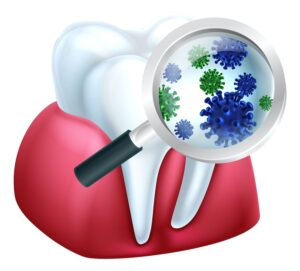Gum disease, also known as periodontal disease, refers to an infection of the gum tissue. It affects more than half of adults in the United States. But despite its prevalence, many people do not know that this disease can cause severe and lasting damage to your teeth, gums, and jawbone.
You practice thorough oral hygiene to clear away excess bacteria to prevent oral infections like these. But some patients may have qualities that put them in greater danger of gum problems than others. Read on to learn about three contributing factors that may put you at a higher risk for contracting gum disease.

Risk Factors for Gum Disease
Aggressive Oral Bacteria
Good oral hygiene practices can keep excess bacteria at bay. The mouth naturally features bacteria, but some people may have particularly aggressive bacteria. The cause of this is unclear. But it may cause destruction in the bone and tissue along with other symptoms of gum disease.
In these instances, proper home care alone might not be enough to protect your gums from infection. Your dentist can check your teeth and gums during routine exams to find appropriate preventative dental care that your unique smile requires.
They may suggest special toothpastes or toothbrushes that will enhance your oral hygiene regimen. They could also recommend an antibacterial mouthwash that will work to balance your oral bacteria. These can then reduce the chances of contracting oral infections like gum disease when used with your other oral hygiene efforts.
Underlying Health Conditions
Age, genetics, certain medications, and other health factors could also impact your gum health. For instance, adults over the age of 65 can see a 70% increase in their risk for gum disease according to research from the American Academy of Periodontology.
An underlying medical condition can affect your gums as well. Heart disease, arthritis, and diabetes all create inflammation throughout the body, which will increase your risk for gum disease. The reverse is also true in that gum disease leads to gum inflammation, which can compromise your overall systemic health.
Changes within the body, like fluctuating hormones or pregnancy, might make the gums more prone to infections. Discuss your medical history with your dentist to ensure you get the best dental care to protect your gums.
Poor Oral Habits
Your lifestyle will also majorly influence your oral health, especially your gums. Smoking can introduce many health concerns, including gum inflammation and slower tissue healing in the mouth. This then puts your gums in increased danger of infection.
Your diet can affect your gum health too, so make sure you eat nutritious foods with plenty of vitamin C to improve your immune system. Then it can better fight off infections like gum disease.
Even if you practice oral hygiene as often as you should, your gums could still be in danger if you do not use proper brushing and flossing techniques. Do not rush your oral hygiene routine. Consult your dentist with any questions and concerns about the health of your gums or the rest of your smile.

